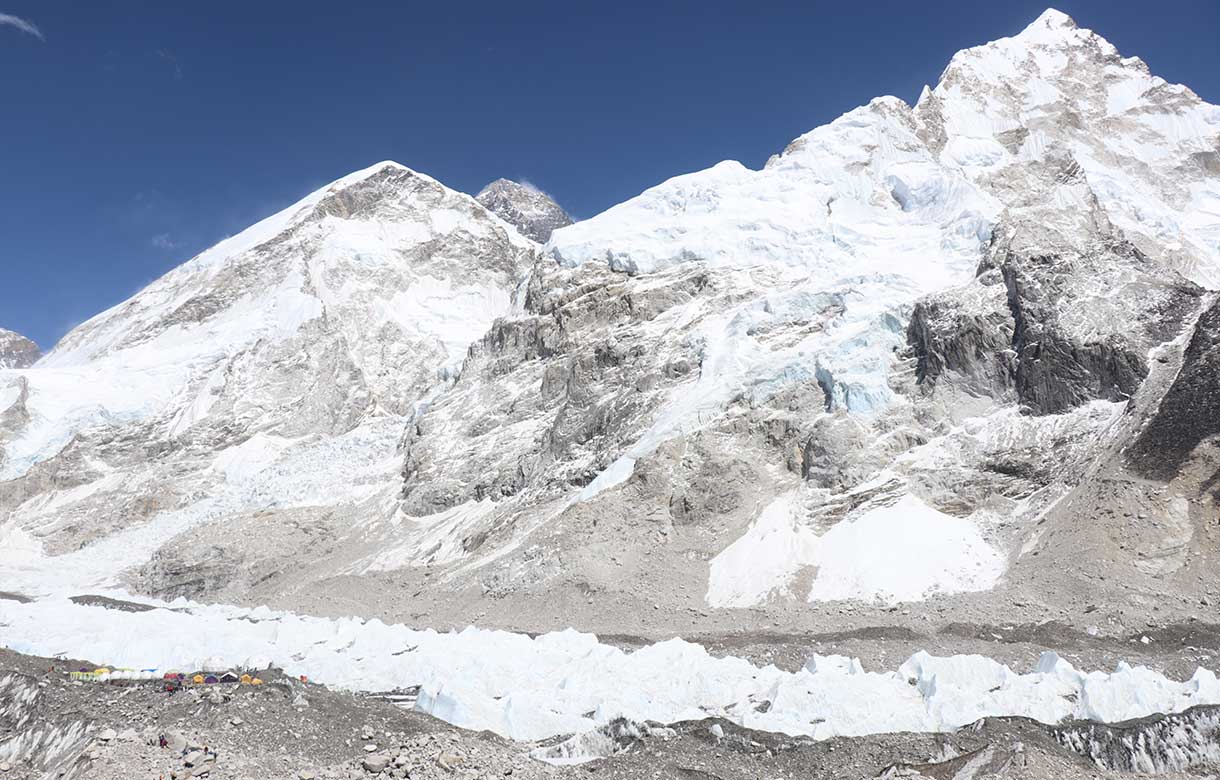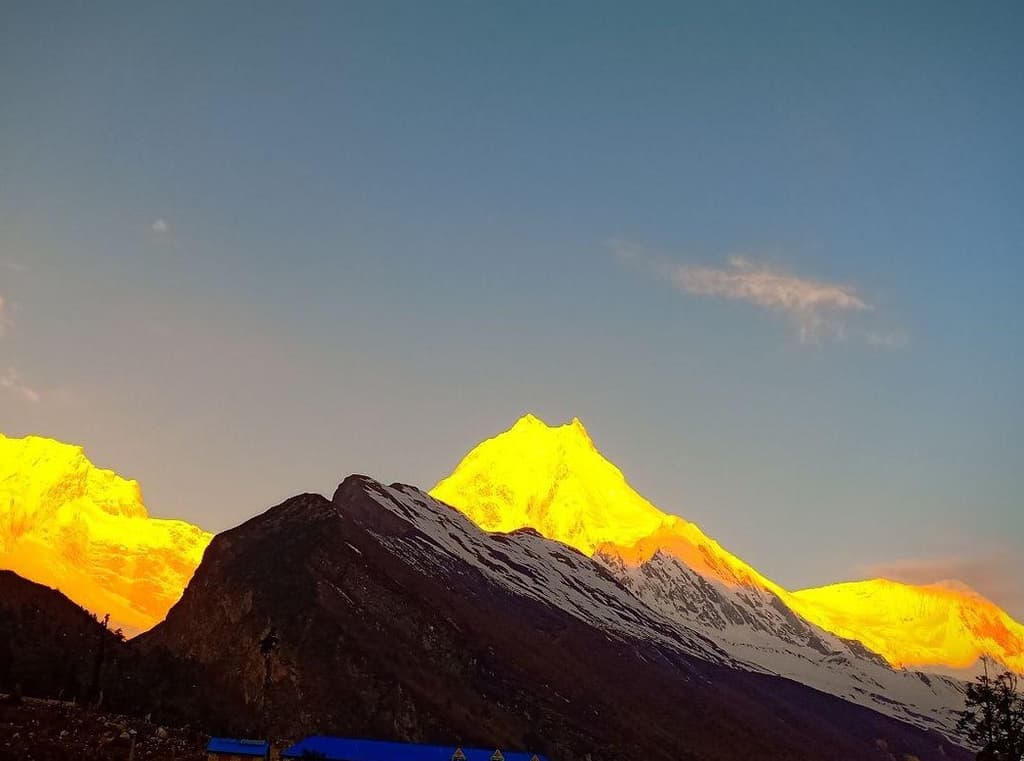The Everest Base Camp trek sounds like a very grand adventure. Since climbing Everest is a great achievement and very expensive, people might associate the EBC trek with it. You might presume the cost for Everest Base Camp trek to be very high and an impossible task to achieve. However, the trek is quite doable and economical.
The cost of the Everest Base Camp trek depends on various variables. Covering your flight tickets, trekking equipment, permits, accommodation and food, guides and porters, etc, are a few of these variables. Overall, the Everest Base Camp Trek can cost anywhere from $800 to $5,000, depending on the level of service you choose and the trekking length. If you choose luxury lodge trekking, it costs around $2,500 to $3,000 per person, while Everest helicopter trekking ranges from $4,000 to $5,000 per person. Managing these factors for the EBC trek is a lot of work. Especially for people visiting Nepal as a foreigner, managing all these amenities for the trek can be tricky. You might not to the procedures or know the right cost of things. That’s why we suggest you do the EBC trek through trekking packages.
People spend a bulk of the money at once and buy trekking packages for the EBC trek. Such packages cover all your variables needed for the EBC trek. These trekking packages come with coverage on food, transportation, accommodation, porters, guides, permits, etc. They also curate itineraries as per your convenience for the Everest Base Camp trek.
However, you need to be careful that you do not get scammed. So, to help you with that, we have made a comprehensive list of how much every variable could cost for Everest Base Camp trek.
Cost for Travel and Visa
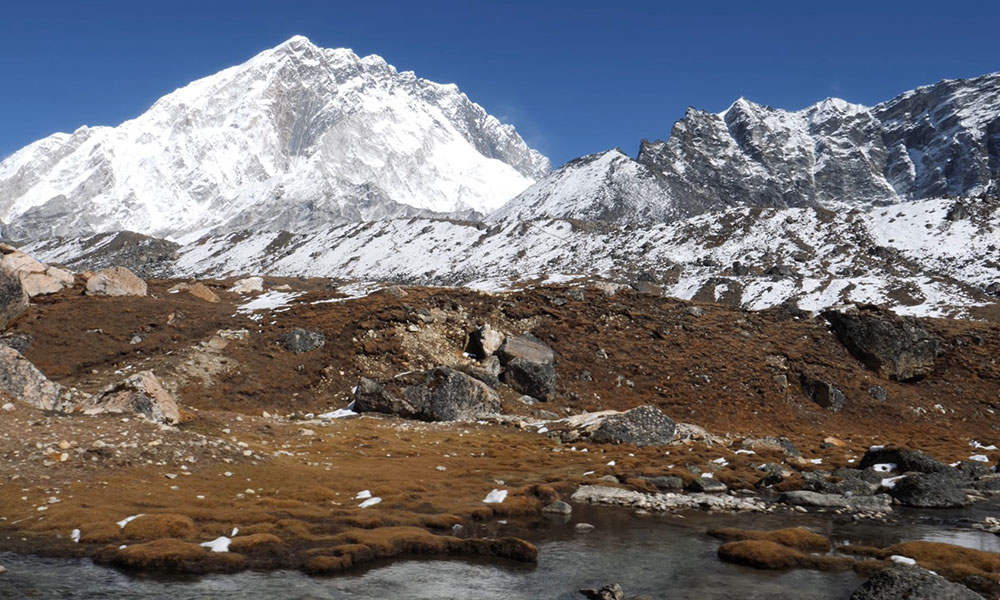
The cost for Everest Base Camp trek does not comprise too high an expense for transportation. You will certainly need to travel a lot, but it will be on foot. However, you do need to get flight tickets to reach Lukla. Most people travel from Kathmandu’s Tribhuwan International Airport to catch a flight to Lukla. The cost of this domestic flight will be around USD 200. You will need to get tickets for two such flights. Hence, a total sum of USD 400 is necessary for the flight cost.
Similarly, you will also need money for minor travel. For example, traveling from the airport to your hotel in Kathmandu or taxi fare to reach the airport to get to Lukla. You might need around USD 20 to USD 50, depending on the number of vehicles you hire.
We suggest you carry around USD 450 to stay on the safer side.
You also have to separate money on your international flights. The cost of international flights will depend on the country you are traveling from. So you ought to do your own research in this regard.
Along with your flights, you also need to pay for an arrival visa in Nepal. You must submit an online application to get your Nepal arrival visa. The cost of your visa is determined by how long you plan to stay in Nepal. The following fees apply to the on-arrival visa:
- A 15-day entry visa costs USD 30.
- A 30-day entry visa costs USD 50.
- A 90-day entry visa costs USD 125.
We recommend you get a 30 days visa so your trip is more flexible. However, you can also squeeze in your Everest Base Camp trek within 15 days.
Costs for your permits
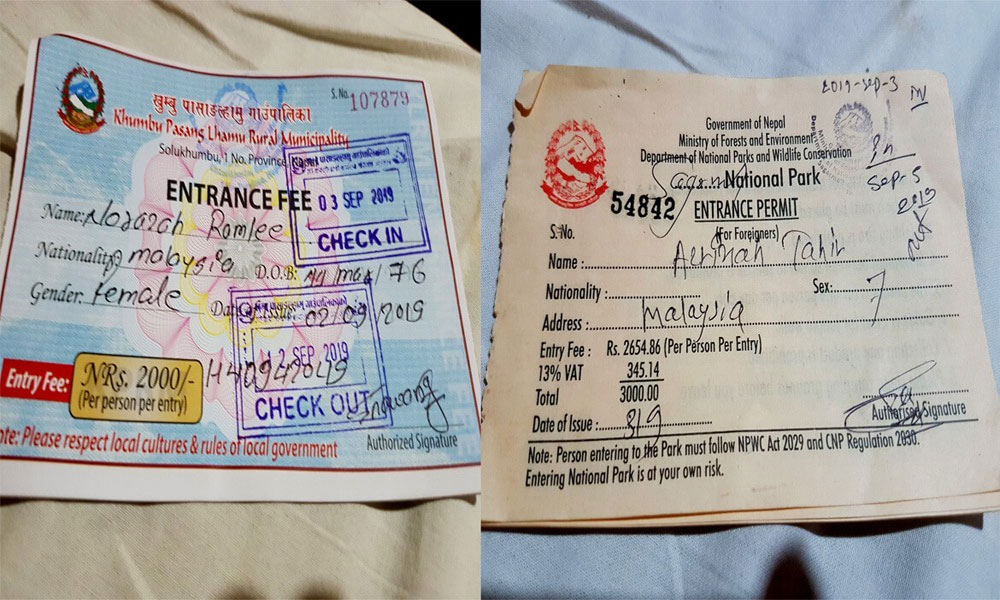
Permits for the Everest Base Camp trek are not very costly. However quite high on the priority list. You cannot do this trek without obtaining permits. We highly suggest you not forget about covering your permits while preparing for the EBC trek. You will require two major permits to do the Everest Base Camp trek.
The first permit you will need is called the Sagarmatha National Park permit. The permit is imposed as you enter the protected trails of the Sagarmatha National Park area to protect and promote its wildlife. The permit will cost you USD 30 in general. However, a person who is a national of the SAARC nations might get it for USD 15.
The other permit you will need is the Local Area Permit. It is called the Pasanga Lhamu rural municipality permit. This permit will cost you around USD 20.
The total cost of the permits you need will be around USD 50.
Costs for your accommodations
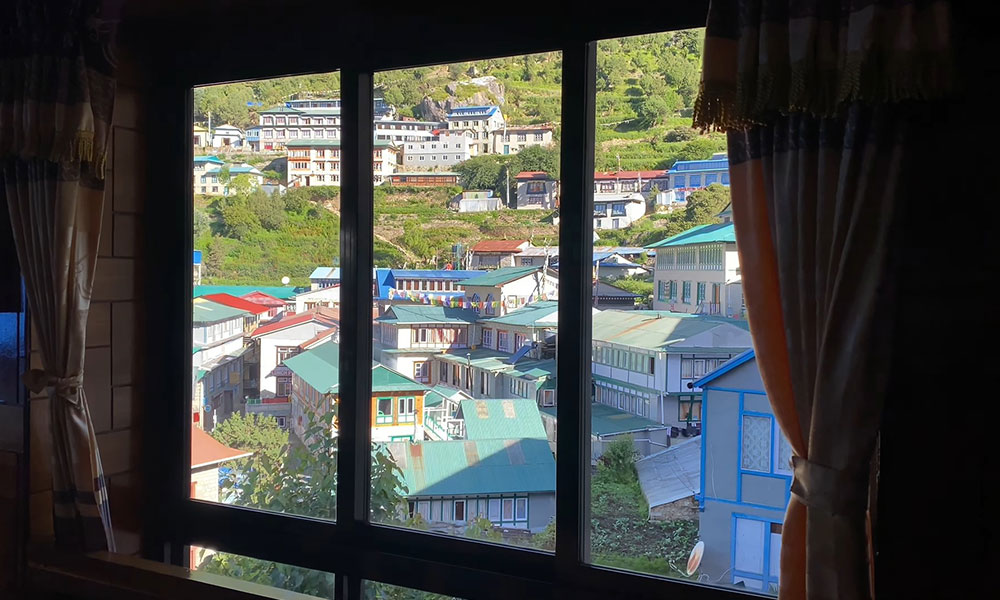
The cost of accommodation and their facilities depends upon the altitude you are traveling to. Accommodations at a lower level of altitudes are more facilitated than those compared to the ones in higher altitudes. The cost also increases as you move up to higher altitudes.
The accommodation in the city area, in Kathmandu, will be well-facilitated hotels. You will find these hotels in the range of USD 20 to USD 250 per night, depending on the luxury. You can find good hotels up to Namche Bazaar as well. The hotels in the Khumbu region might cost around USD 20 per night.
As you travel to further remote places, you will find local tea houses for accommodations. These local tea houses will cost around USD 6 to USD 9 per night. The local tea houses are the last resort during your Everest Base Camp trek. They will not have the most lavish of amenities. Since resources cannot be easily transported in the remote Himalayan trails, they are scarce. You will be given the best services as per the capabilities of the locals.
You will get private rooms with attached restrooms along with proper beds, bedsheets, blankets, and pillows. They usually have a communal dining area with burning firewood place to keep warm. Although the facilities are minimal, they are very good. When you are staying over in such tea houses, make sure you do not bargain. The locals live in harsh conditions and try their best to provide you with services. They do not serve you with any malice.
Cost for your meals
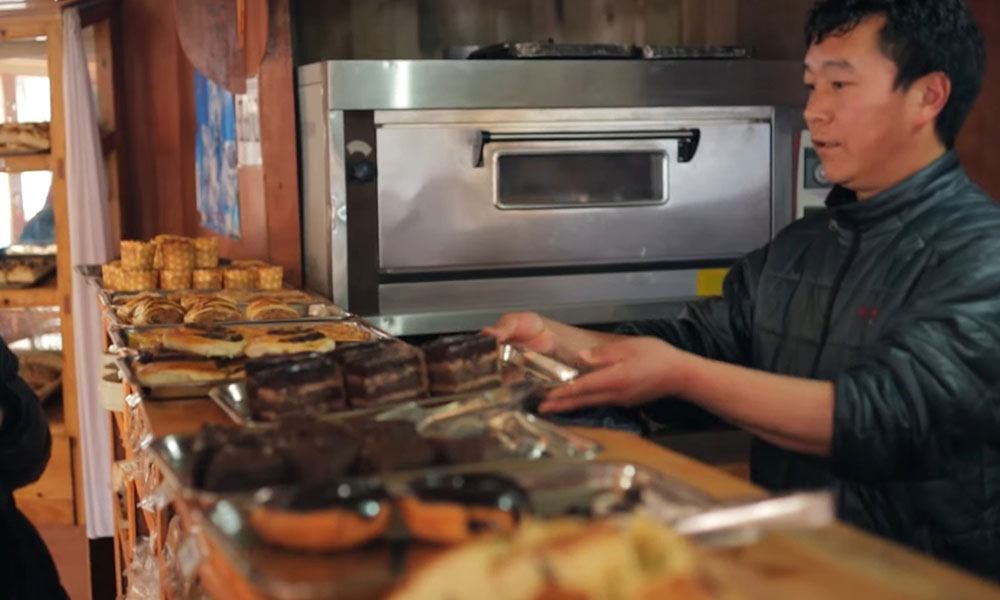
When you arrive in Kathmandu, you will get varieties of food from various restaurants around town. However, such a range is not available in remote trails of Khumbu. The trails of the Everest Base Camp trek house scarce resources. Since transportation of commissariats is done through animals or by foot, very few resources are available.
So, the local tea houses will serve you staple Nepali household food. You will likely be served with rice, lentil curry with vegetables, or perhaps roti. Other items like thukpa, mo: mo, and soups will also be available.
The availability of resources will decrease as you go higher, but the cost will exceed. In lower places, you will get one meal for around USD 5 per person. However, the higher you go, the cost increases as the freight for getting commissariats increases. You might have to pay around USD 8 to USD 12 for the highest part of the treks. Separating money in the range of USD 20 to USD 25 for a day’s worth of meals for a person would be optimal.
The tea houses also do serve drinks, if you were wondering. They have options for tea, milk, coffee, soft drinks, and even alcohol. You will get a cup of tea at around USD 2 to USD 4. Similarly, you can get coffee at USD 3 to USD 5. Options of a few beers costing around USD 5 to USD 10 per bottle might be available. Similarly, you can get soda drinks like Coke, Pepsi, Fanta, etc., which will cost USD 2 to USD 5.
We do not suggest you consume alcohol during your trip and recommend you lower your caffeine intake.
Drinking water facilities are also plentily available during your trek. Most tea houses have free drinking water facilities. You can also buy water bottles to carry for your journey at the price of USD 2 to USD 5. There is also an option of getting fresh water from nearby waterfalls and springs on the trail. You just need a water bottle and water purifying tablets to ensure the water is consumed properly.
Cost for guides and porters
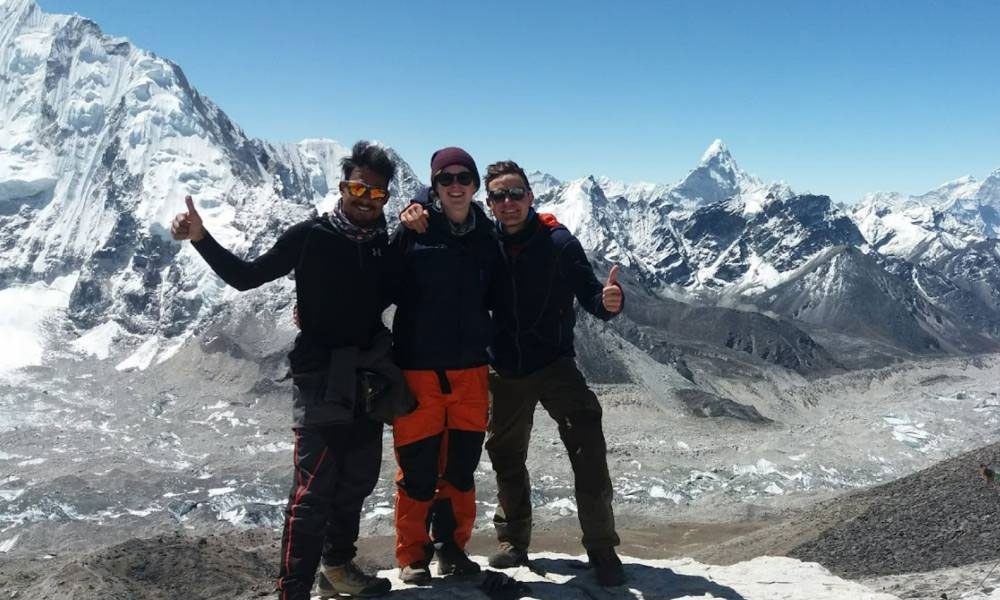
One of the essential variables you have to cover for the Everest Base Camp trek is guides and porters. The mountain trail treks in Nepal impose a compulsion on taking trekking guides for foreign trekkers. This applies to the Everest Base Camp trek as well. You cannot do the Everest Base Camp trek if you do not have a licensed guide accompanying you.
There are different types of guides, and they have varying fees. You may pay a guide anywhere between USD 30 and USD 40 per day. The guides can serve as interpreters, navigators, and instructional aids.
The more experienced, skilled guides will be more knowledgeable about your trip overall. Amateurs will offer you the most basic advice they can for the trek. Despite the range, all the guides will be trained licensed guides. So they will have a great standard that they maintain as service providers. Regardless, they will satisfy your need for a guide for the Everest Base Camp trek.
You could also require porters in addition to your guides for the trek. It will take a lot of effort to make the Everest Base Camp trek successful. Porters must therefore be included in your Everest Base Camp trek budget.
On your journey, you might come across some guides who double as porters and assist you with your bags. On the other hand, depending on how big your luggage is, you might need independent porters. Porters typically cost between USD 20 and USD 30 per day per person. A porter will carry bags weighing between 20 kg and 25 kg.
Miscellaneous expenses
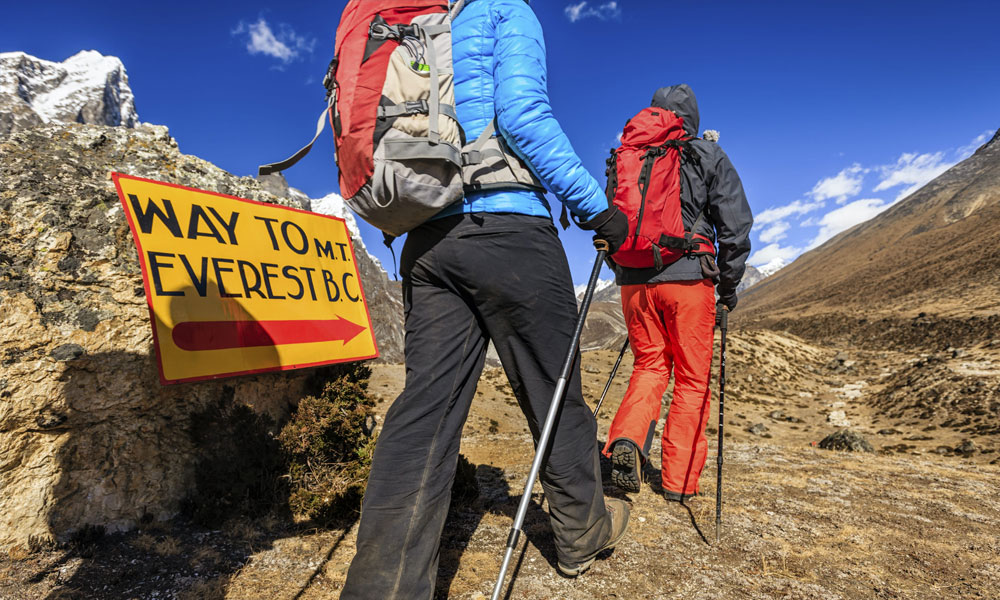
- During your Everest Base Camp trek, you might not be in access to good electric services. Remote places do not have well-facilitated technology. If you have to charge your devices, you might have to pay USD 2 to USD 3 for it. So separate the budget accordingly. But we highly recommend you invest in a power bank and charge them on your own.
- Just like electricity, the wifi services in the remote trails are quite scarce and expensive. Getting wifi in the trails is quite rare, but when you do, it costs around USD 3 to USD 5 per day. However, you can also invest in buying a Nepali SIM card along with a data package. You can spend around USD 10 for this and get internet. But do not expect proper network services in the Khumbu trails.
- If you need hot water for cleaning or washing, you cannot get hot running water. Hot water will be available if you ask, but the staffs in the tea houses boil it over the fire. They transfer such hot water into a bucket and give it to you. Such services will cost you USD 2 to USD 3 per bucket.
- You will travel to various local hamlets and monasteries during your trek. The locals at the monasteries will expect some donations from you during the trek. You will also need to tip your serves, guides, and porters for the trek. So we recommend you separate around USD 10 for a day for such an expense.
- We also recommend you invest in travel insurance in your home country for caution. In case of any unforeseen incident, accidents, injuries, or health issues, such insurance will be helpful.
- Additionally, we suggest that you invest prudently in your trekking gear. It is necessary to wear ankle-high hiking boots, thermal tights, dry hiking pants, trekking socks, etc. The nights on the high-altitude trails can be freezing, so pack extra clothing for the night. Get a wool cap, a scarf, and gloves to keep warm. Additionally, invest in a high-quality sleeping bag to keep the tea shops in the suburbs clean. The beds cannot be washed between each customer, so a sleeping bag is required.
- We also suggest you invest in your fitness to prepare for the Everest Base Camp trek. With the immediate cost for Everest Base Camp trek set aside, investing in building a fit body will be of a lot of help. Add your regular gym membership fee to the list of things you need to budget for the EBC trek.
Things to consider
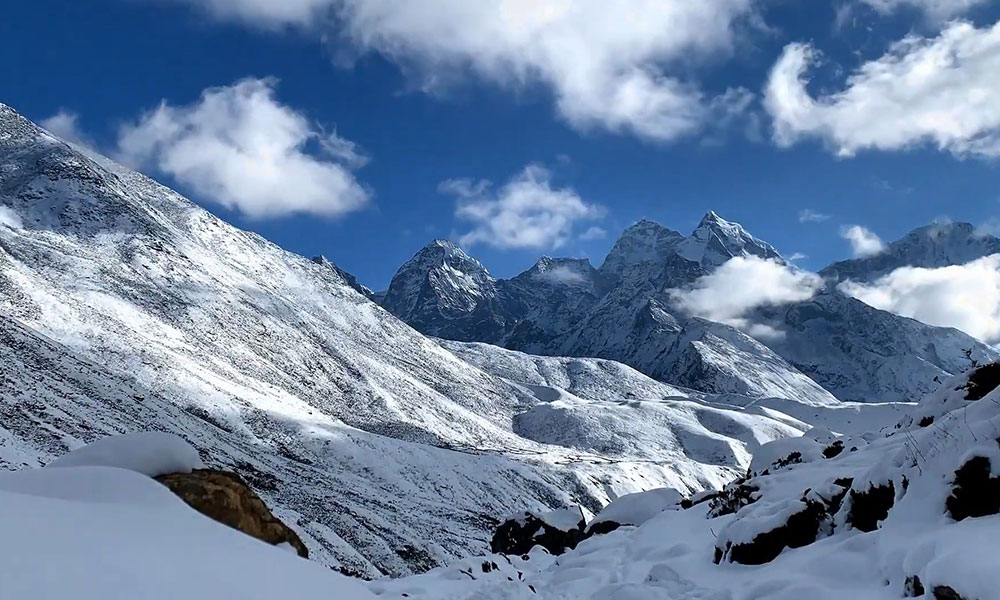
- The cost of the variables needed for the trek is mentioned here in US dollars. However, you need to spend Nepalese Rupees on the remote trails of Khumbu. The exchange rate of USD to NRs is USD 1 = approximately NRs 120 to NRs 130. Make sure you check it and exchange your money back in Kathmandu.
- Donkeys, yaks, or on foot carry most of the commissariats for your trek. It is exceedingly challenging to trade commodities and get resources in this area. As a result, you'll pay more than you would in Kathmandu (NRS 20) for a cup of tea, close to NRs 200. The cause is the trail's remote location and challenging access. As a result, the majority of your itinerary's cost is fixed; do not gripe about it. Bargaining is also not recommended because it is disrespectful and immoral.
- Make sure you carry enough cash on you to make your payments during the trek. You need cash for all of your payments. Only cash is accepted for the guides, porters, meals, lodging, and other financial transactions. The distant location lacks banks and ATMs, and locals cannot accept credit cards or online payments. Cash is the only form of payment accepted. So be sure you have enough change in your wallet.
Final Say
These minor details are necessary to be covered for a successful EBC trek. When you spend money on these branched variables, it will bulk up to a range between USD $800 to $5,000 dollars. Deals covering all your variables can be available in a similar price range. As we mentioned already, trekking agencies will cover your Everest Base Camp trek cost. They will manage all your logistics, plan your itinerary and cover all the costs of everything you need to manage.
Hiring and paying strangers from foreign countries in an arbitrary manner is difficult. So we suggest going through an organized way by buying a trekking package. We at Nepal Eco Adventure provide such packages for the Everest Base Camp trek too. This package will include the following:
- Hiring guides and porters for the duration of your trek.
- Meals and accommodation costs for your treks.
- Arrangement of the permits needed for your trek.
- Transportation management for your travel along with flight tickets to and back from Lukla.
- Pick up and drop off at the international airport and provision of hotels for you in Kathmandu.
If such an offer is what you’re looking for, for your Everest Base Camp trek, let us know and do check out our most recommended Everest Base Camp Trek package- Short Everest Base Camp Trek.
You can Contact us for more info or to book your EBC package.

